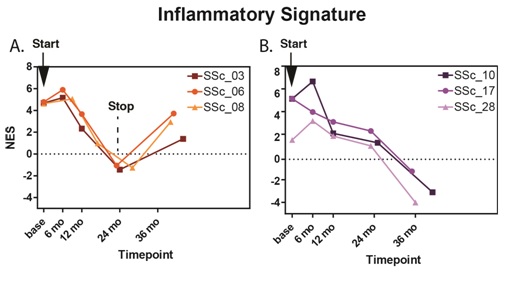Session Information
Date: Wednesday, November 16, 2016
Title: Systemic Sclerosis, Fibrosing Syndromes and Raynaud's – Pathogenesis, Animal Models and Genetics II
Session Type: ACR Concurrent Abstract Session
Session Time: 9:00AM-10:30AM
Background/Purpose: We previously showed patients in the inflammatory subset were most likely to demonstrate improvement in modified Rodnan Skin Score (mRSS) during mycophenolate mofetil (MMF) treatment. Here, we show that MMF abrogates the molecular inflammatory signature and that the inflammatory signature and myeloid immune cell counts rebound after treatment cessation.
Methods: Sixty-eight SSc patients and 22 healthy controls were enrolled. Clinical data and 358 independent biopsies were obtained and analyzed at baseline, 6, 12, 24, and 36 months (mo). Immunohistochemistry (IHC) was performed on skin biopsy sections using a CD163 marker for macrophages and CD1c for myeloid dendritic cells (mDCs). Genome-scale gene expression was measured. Clinical improvement was defined as a decrease in mRSS ≥ 25%. Subjects with longitudinal skin biopsies and at least 24 mo of follow-up were termed completers. We calculated a normalized enrichment score (NES) for the inflammatory signature on a per-biopsy basis using ssGSEA.
Results: Six of the 11 completers showed 2 distinct response patterns between 24 and 36 mo determined by MMF therapy status. Three subjects showed a significant decrease in their inflammatory signature at 12 and 24 mo, paralleling decreases in T cell, macrophage and DC gene signatures, as well as mDC/macrophage IHC counts. MMF cessation at 24 mo resulted in a return of their inflammatory signatures and mDC/macrophage IHC counts, typically with an increase in mRSS. In contrast, 3 subjects that continued MMF therapy showed decreased inflammatory signatures through 36 mo with decreasing or stable mRSS. The remaining 5 completers largely showed an absence of the inflammatory signature at baseline and no improvement during MMF therapy.
Conclusion: A subset of patients receiving MMF lose their inflammatory signatures and show decreases in skin myeloid cells. After cessation of MMF, these patients show rebounding inflammation, worsening mRSS and increases in skin mDC/macrophages. Patients remaining on MMF show stable to decreasing inflammatory signatures that coincide with stable mRSS. These results show that significant mRSS improvement during MMF occurs slowly over a 12-24 mo period, and may involve T lymphocytes, macrophage and mDC molecular pathways. These data summarize the effects of MMF on gene expression pathways and myeloid cell localization in the skin and support MMF treatment beyond 24 mo in SSc patients that demonstrate mRSS improvement.
Figure 1. Kinetics of the MMF Response in SSc patients. A summary of inflammatory gene signature in six patients treated with MMF. Arrows indicate start of MMF treatment; dashed lines indicate MMF treatment cessation. A. Three patients that lose their inflammatory signature during (to 24 months) with improved mRSS and rebound at 36 months after MMF treatment is stopped, with a concomitant increase in MRSS. B. Three patients with sustained improvement in mRSS do not stop treatment and show a sustained loss of inflammatory signature.
To cite this abstract in AMA style:
Toledo D, Hinchcliff M, Taroni J, Wood TA, Franks J, Shah S, Agrawal R, Beussink-Nelson L, Carns MA, Podlusky S, Pioli P, Whitfield M. Longitudinal Analysis of MMF Clinical, Molecular, and Immunohistochemistry (IHC) Responses Shows SSc Patients Lose Their Inflammatory Signature and Rebound upon Treatment Cessation [abstract]. Arthritis Rheumatol. 2016; 68 (suppl 10). https://acrabstracts.org/abstract/longitudinal-analysis-of-mmf-clinical-molecular-and-immunohistochemistry-ihc-responses-shows-ssc-patients-lose-their-inflammatory-signature-and-rebound-upon-treatment-cessation/. Accessed .« Back to 2016 ACR/ARHP Annual Meeting
ACR Meeting Abstracts - https://acrabstracts.org/abstract/longitudinal-analysis-of-mmf-clinical-molecular-and-immunohistochemistry-ihc-responses-shows-ssc-patients-lose-their-inflammatory-signature-and-rebound-upon-treatment-cessation/

